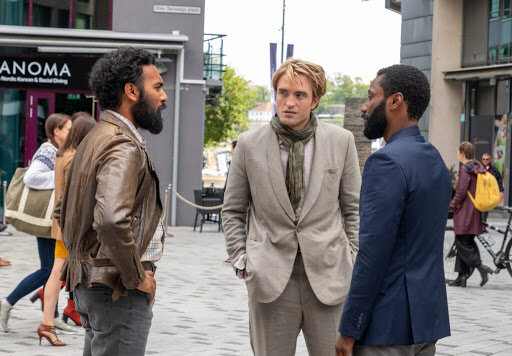Tenet
Nolan’s true triumph lies in filling this complex world with characters who keep it spinning with their desires, which in turn are finely tuned products of the new world and the familiar.
Tenet should take my university degree and mount it on its office wall. It should take my money and invest it. Because it is smarter than me.
Yet the film succeeds not on this overwhelming, often overweening intelligence. Rather, the recipe is its ability to paint complex, believable relationships between its characters. It gives them motivations that make sense, and that are satisfying to uncover. Where the rules of time and space are applied differently, our rules of human connection root ever deeper.
This is no small claim when the villain (Kenneth Branagh) wants to destroy the universe and everything that’s happened and will ever happen, and he is a human. You’d think he’d have trouble betraying his own existence. This is what John David Washington sets out to prevent. Of course, Washington doesn’t know that at first.
Ignorance is going to be standard operating procedure here. This is the maxim by which the characters must often abide, and so did I. The rumors are true; it is the most vexing, labyrinthine film world you’ll likely ever encounter. It took director Christopher Nolan the better part of fifteen years from inception to final draft. No doubt it will both invite and reward multiple viewings. That it obeys all its unique rules of physics and time, I simply must concede to the filmmakers.
More from Michael Augsberger:
It does detract from the experience, though. There is joy in simply trusting Nolan to arrive at a sensible conclusion, which he certainly does. But at times he relishes in confusing us, and it is impossible to amalgamate all we’ve learned with new images to fully appreciate his handiwork in real time.
Nolan’s true triumph, then, lies in creating this complex world and filling it with characters who keep it spinning with their honest desires. These in turn are finely tuned products of the new world and the familiar. Washington meets Branagh by exploiting his estranged marriage with Elizabeth Debicki, who has much reason to despise her husband. Likewise, Robert Pattinson’s friendship with Washington is extraordinarily satisfying.
I will not reveal Branagh’s motive, except to say it is brilliant and the only believable explanation for his actions. Only does not mean easy. Hollywood has had a century to give motive to world annihilation and either failed or never bothered; if Nolan spent one year on inversion and fourteen perfecting Branagh, I would not be surprised.
Inversion is Tenet’s addition to the time travel genre. Bullets, cars, and eventually people, can move backwards through time. To normal people, they appear to be moving in reverse. The logic of this can be brilliant. How much more successful would military maneuvers be with the benefit of hindsight?
It also raises philosophical questions about free will. Who causes what, and in what order of time? “The bullet never would have moved if you hadn’t put your hand there,” is the answer Washington receives.
Credit Nolan for giving life to such a creature and trusting us to grapple with it. We are dropped right into action that will make sense later, but only if we concentrate without knowing what to concentrate on. He changes pace to give us an opportunity to learn the inversion technology, which feels refreshingly unlike exposition but more like The Matrix’s famous scenes.
There is no shortage of creative ways to remind us who is moving normally, and who backward, through time: Language, colors, screens, motion, masks, portals. There are few stones unturned when it comes to exploring the side effects of inverting time. It’s fascinating to learn the rules and notice the symbols—of freedom, of friendship—that only this world could create.
However, traditional time travel takes place, too. And this is where some of the brilliance can break down. Why do some characters opt for inversion when ordinary time travel is much cleaner? Sometimes it is obvious why. Sometimes it is questionable. And it is not at all clear that it’s even an option until late in the game.
I confess this is one movie where I’d like to see the alternate ending. If Nolan, having swung for the fences of evil, found a satisfying way to film that, he really would be a god—of sorts.
—
3.5 of 4 inverted bullets

Unquestioningly a noir, Spacey’s return mystery treads predictably, not with great reward but with interplay between remorse and revenge.